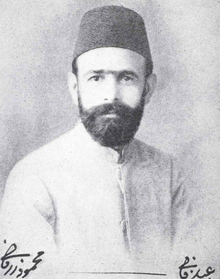
A Note from the Publisher of Mahmud’s Diary
In the spring of 1912 `Abdu’l-Bahá set off from Alexandria on His historic journey to America. Among his small entourage was Mírzá Mahmúd-i-Zarqání, who became, in the words of Shoghi Effendi, `the chronicler of His travels’.
Mírzá Mahmúd had made a number of teaching trips through Iran and in 1903 began to teach the Bahá’í Faith in India. He was, therefore, already a seasoned traveller by the time `Abdu’l-Bahá asked him to journey with Him to the West. Mírzá Mahmúd went everywhere with `Abdu’l-Bahá, making extensive notes not only of the Master’s many public talks and conversations with individuals but also of the new sights and experiences they found in America as well as the daily routines of eating, writing letters and travelling. Mahmúd remarks on the novelty of the New York skyscrapers, electric lights and American foods and customs for `Abdu’l-Bahá’s party as well as the picturesque spectacle provided to the Americans by His entourage in their `abás and Persian hats.
`Abdu’l-Bahá’s journey across America was remarkable. He was 68 years old and had been a prisoner most of His life. When He set out from Egypt He was unwell and planned only to travel to the American East coast and to Chicago. However, the American Bahá’ís begged Him to visit their communities and He undertook the strenuous three thousand-mile journey across the continent by train, sitting up most nights in a chair rather than spend money on a sleeping compartment. He spoke at public meetings nearly every day, sometimes three times a day, and gave hundreds of private interviews. His hectic and exhausting schedule is well-documented by Mírzá Mahmúd, who frequently alludes to the anxiety of the Master’s companions over His health. Mahmúd’s telling references to the simplicity of `Abdu’l-Bahá’s lifestyle — `For dinner `Abdu’l-Bahá ate only a little bread and cheese and went to bed’ — contrast with the opulent lives lived by many of the Americans who visited Him.
The present work is a translation of the first volume of Mahmúd’s Badáyi`u’l-Átha’r, an impressive documentary which he appears to have written from his notes on his return to the Middle East in 1913. Mahmúd made extensive notes of many of `Abdu’l-Bahá’s major talks and various private conversations. The translations of `Abdu’l-Bahá’s words recorded in the present volume were read and revised at the Bahá’í World Centre. The publisher is grateful to Kalimát Press, who undertook the original translations of these passages, for their kind permission to use these translations in the present volume.
The Universal House of Justice, in a letter of April 30, 1984 to the National Spiritual Assembly of the Bahá’ís of the United States, stated that it
. . . attaches great importance to this work which, as you may know, is regarded as a reliable account of `Abdu’l-Bahá’s travels in the West and an authentic record of His utterances, whether in the form of formal talks, table talks or random oral statements. Mírzá Mahmúd was a careful and faithful chronicler and engaged in assembling and publishing his work with the permission of the beloved Master, as he states in the Introduction. Indeed, Shoghi Effendi drew upon it for details about the Master’s visit to the West in writing God Passes By . . .
Mahmúd wrote in Persian in an ornate style not often used for English prose. Certain phrases common in Persian are inelegant when translated into English and these have, for the most part, been omitted, for example, `His Luminous Presence’, `His blessed Person’ and so on. The Universal House of Justice itself, in a letter of July 24, 1987, to a publisher advised that the word `Hadrat’, meaning `His Holiness’, `should not be used in this translation, especially when referring to `Abdu’l-Bahá’. However, without burdening the work with many of the flowery descriptions that may seem peculiar to a reader of English, the translator has tried to retain the flavor of the original Persian. Mírzá Mahmúd was, after all, a Persian and brought his own culture to bear on his American experience.
To assist the reader, the publisher has added explanatory endnotes and biographical notes on many of the people mentioned in the diary. These do not form part of the original text.
The names of some of the people mentioned in the text are unclear. Mahmúd recorded in Persian the names of Americans as he heard them pronounced. As not all vowels are written in Persian, it is not always possible to be sure which name is meant. For example, the name of Mr and Mrs Killius when written in Persian script could also be read as Clives and it is only be careful research that the correct spelling has been found. Some of the people mentioned are not named in English-language Bahá’í histories and we cannot therefore be certain how their names should be rendered.
Mahmúd occasionally mistakes the date of a particular event or talk by `Abdu’l-Bahá. This may be due to his unfamiliarity with the Gregorian calendar or that he was apparently writing some time after his return from the West.
The sheer volume of `Abdu’l-Bahá’s activities and the pace He set Himself as He traveled made Mírzá Mahmúd’s work more difficult than that of most diarists. That he wrote so comprehensively and so accurately under such circumstances is a tribute to his devotion to `Abdu’l-Bahá and to his skill as a chronicler. ~ Mahmúd’s Diary The Diary of Mírzá Mahmúd-i-Zarqání – Chronicling `Abdu’l-Bahá’s Journey to America